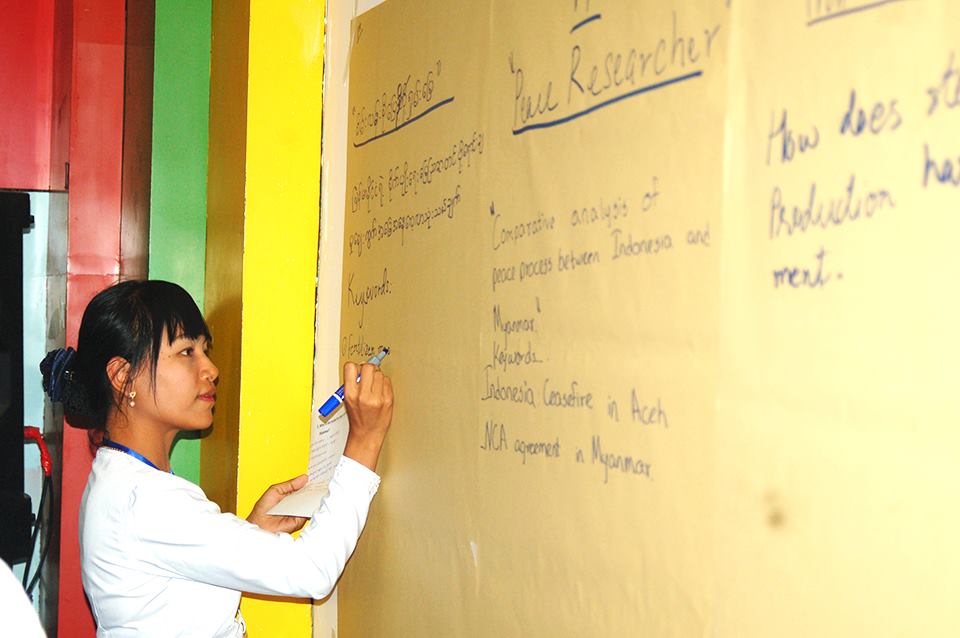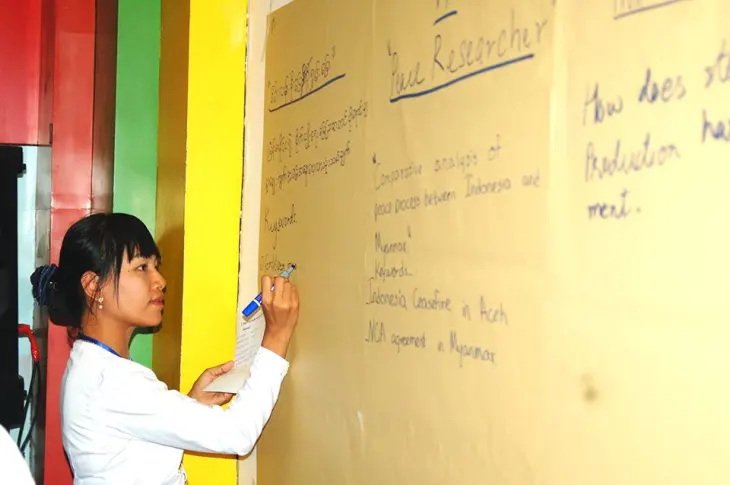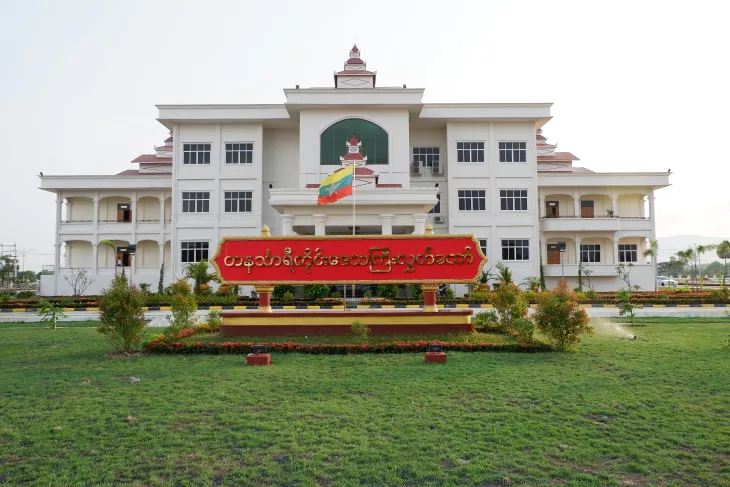
Nyein Thiri Swe and Zaw Min Oo from the Enlightened Myanmar Research Foundation (EMReF) assess the performance of the sub-national parliaments and change in their structural constraints since the transition.

A second five-year term of Myanmar hluttaws, the country’s parliaments, has approached its midterm. Has the campaign slogan of the NLD, “Time to Change”, translated into action in Myanmar’s hluttaws? In this article, we aim to assess the performance of state and region hluttaws. As we will argue, some hluttaws are on the track of change and have undergone significant progress, while others have not lived up to positive, but rather negative change. This article starts with a brief introduction to the parliamentary system of Myanmar, which aims to help the reader locate the object of this article: the sub-national parliaments. The article proceeds with our assessment of the NLD’s performance in these parliaments.

There are two types of legislatures in Myanmar, namely the union parliament and the state and region parliaments. The union parliament is bicameral, known as the Pyidaungsu hluttaw. On the one hand, the Pyithu hluttaw represents the people and townships; on the other hand, the Amyotha hluttaw represents the states and regions. Both hluttaws form an electoral college consisting of three groups of law makers. These groups include the elected representatives to the Amyotha hluttaw, the elected representatives to the Pyithu hluttaw, and appointed military representatives to both hluttaws.
There are 7 states and 7 regions in Myanmar. Each state or region has its own legislature or hluttaw, which is unicameral. There are two types of members in each hluttaw, namely elected representatives and appointed military representatives. However, the number of appointed representatives is one third of the total of the elected members or one fourth of the total membership. The president serves as the head of the state and the government. The Chief Ministers nominated by the president are the heads of the state and region governments. The number of seats in each state or region depends on the number of townships (each township constituency has 2 MPs), as well as ethnic representatives. State and region hluttaws in Myanmar have the same constitutional status and undertake the key functions in legislation, oversight, and representation on their respective matters in accordance with Schedule 2 of the 2008 constitution.
As almost all legislative members of state and region hluttaws were newly elected in the 2015 general election, time is needed for them to gain competency in parliamentary work. While there have been tremendous institutional and individual constraints, namely personal attributes of leadership skills, limited institutional and human capacity, it seems apparent that MPs have been trying to work for a positive change in their respective constituencies.
Typically, the Pyidaungsu hluttaw has been practicing a system which has a clear separation of powers between the legislative and executive branches, and thus members of the national legislature take on a legislative role. In state and region hluttaws, however, members are allowed to take dual roles, both as legislative members and executive members, particularly in ministerial positions of sub-national governments. While the consequence of taking such dual roles seems not to have had a significant impact on state and region hluttaws which have larger numbers of representatives, it poses obvious effects in areas such as oversight, legislation, and representation on some smaller hluttaws such as Mon, Tanintharyi, Kayah and Kayin. This fact was also revealed by EMReF’s Performance Analysis of State and Region Hluttaws (2010-2015) Report. Seeing this structural constraint and having lessons learned from the first tenure, the newly elected government in 2016 appointed more non-legislative persons with technical expertise in cabinet positions.[1]
One can observe that sub-national parliaments have taken a more active role in oversight over budget expenditures and policy implementation since the second half of last year. State and Region Parliaments News Bulletin states that non-partisan checks and balances by some local hluttaws are clearly emphasized by media and observers. At the same time, both national and local governments seem to take more into consideration the will of the Central Executive Committee (CEC) members of the NLD in appointing new cabinet members as the capacity and relevance of proposed appointees were questioned by some active individual MPs. Some important instances include changes in the Chief Minister’s position in Mon State, the impeachment of a Municipal Minister of Rakhine State, and a review of the proposed appointees for the two vacant ministerial positions in Magway Region. For instance, the Rakhine State Economic Minister was accused in some cases – such as the implementation of new projects which have not been approved by the Hluttaw, the ground expenses of which are more than what was actually allotted for the specific project. Such an instance reflects that the state and the region hluttaws have become crucial despite the fact that state and region Chief Ministers are directly appointed by the President, whereas ministers are appointed by Chief Ministers of respective state and regions.
The domination of hluttaws by a single party elected by majority votes in the general election in all legislatures, including almost all sub-national parliaments (which in fact is a similar power dynamic with the previous legislatures of 2010-2015) has existed in the current tenure of the hluttaws. As a result, checks and balances, or the legislative oversight of local legislatures, particularly in Magway, Karen, Mandalay and Bago, have remained a passive process and the legislators have followed a “wait and see” strategy. MPs have applied their party’s rule and regulation in order to achieve goals prioritized by the party.
Powerful cabinet members, notably the Chief Ministers, seem to exercise personal influence on respective sub-national hluttaws, particularly in Yangon, Karen, Magway and Mandalay. As a result, legislative members, and even entire legislatures, are starting to lean towards the policy directions of Chief Ministers. While some Chief Ministers expressed their concerns for this situation, they have also been facing a reality of personality cult by their fellow party members.[2] However, there are also some sub-national hluttaws that have intentionally made efforts to change the situation. They have emphasized lapses in government’s policy agenda and budget spending, especially on local development projects. Since late last year, several speakers of local legislatures have spoken up to demand that Chief Ministers and other cabinet members submit their plans to the hluttaw for approval by pointing out Section 251 of the Constitution.[3] In this respect, the Tanintharyi hluttaw even tried submitting the case to the constitutional tribunal. However, the case ended up with a negotiation between the hluttaw and the ministry.
Almost all local legislatures enhanced oversight activities on routine laws such as budget bills and local development plans. The opportunity to discuss and question bills has been taken on either by individual members or by oversight committees. In the first hluttaw term, budget bills and other bills were submitted only at the last minute and given very limited time for review by hluttaws. In this term, the situation has improved. Hluttaws in the NLD-led government era seem to have effectively negotiated with their executive branches to have bills submitted early enough for review and discussion at hluttaws, though the degree of improvement varies.[4]
In terms of legislative improvements, two significant improvements can be observed. First, legislative efforts in developing laws which address everyday needs and livelihoods of the people. For instance, the Fresh Water Fishery Laws of Ayeyarwaddy and Bago regions were amended and approved in early 2018 by reflecting on some recommendations and demands of local-based fishery CSOs, including small-scale fishery groups. Second, law-making processes and practices in some local legislatures have become more inclusive and practice stakeholder consultations. Advice from local civil society organizations, people with technical capacities, and local leaders and stakeholder communities were taken into consideration during the law-making process. Such improvements can be seen in the policy making processes of the recent freshwater fishery laws of Ayeyarwaddy and Bago regions mentioned above, and in the law-amending process of municipal laws in Sagaing and Magway regions. These improvements not only bring hope for positive change at the local level, but also serve as models of change among sub-national hluttaws.
Policy Implementations: Regarding policy implementations, structural limitations and ambiguities in the 2008 Constitution can still be seen to pose significant constraints on sub-national hluttaws. Until now, important laws, such as the land tax law, which was first approved by the Mon State hluttaw in 2014, have not become effective or implemented. Similarly, other state and region hluttaws have hardly taken further efforts to develop land tax laws.
Representation: The representative role of Myanmar’s sub-national hluttaws are normally highlighted by motions and questions by individual members in general. Nonetheless, the members of the hluttaws of the NLD-led government are using a new strand of representative strategy to address the needs of their constituencies. Individual members directly approach ministers or director generals of respective ministries to inform and address the needs of their constituencies. Some members openly stated that such a direct engagement is more effective than shooting questions or motions in hluttaws, for which they have to wait until hluttaw sessions are convened. They also need to wait for the formal process to get the answers from respective officials from ministries. On the other hand, service providers, who are executive members of regional and state governments, seem to prefer this method and they even encourage members to directly approach them. This method seems to provide a quicker solution for some individual members and some constituencies. However, it has already affected the role of hluttaws in their oversight function. In several state and region hluttaws, a number of official commitments given by the executive offices during hluttaw sessions have been noticeably decreasing compared to the previous years – particularly as the number of questions and motions that would require the presence of ministers to answer and provide their commitment before hluttaws has reduced in some hluttaws. One can easily imagine some other negative effects that could follow like transparency issues, rent seeking and corruption.
Infrastructure improvements: Infrastructure improvements, particularly the new separate hluttaw offices, help promote a good image and role of state and region hluttaws. Building of new hluttaw offices mostly started in late 2014, and was finished between late 2015 and mid 2016. Now, almost all sub-national hluttaws, except some hluttaws including Chin, Magway and Ayeyarwaddy, are in new buildings at separate locations from the annex of state and region general administrative offices, where the executive branches of the sub-national governments reside. This visual image speaks volumes: the independent role of the hluttaws is literally highlighted by the graceful appearance of new hluttaw buildings.
Institutional Support and Capacity Building: More importantly, institutional support and capacity building efforts of state and region hluttaws are favored by significant institutional change. In April 2016, the Pyidaungsu Hluttaw decided that supportive offices of all state and region hluttaws should be removed from the management of general administrative department (GAD) of states and regions. These offices were to be under the direct supervision of speakers of respective hluttaws, and moved to the line of institutional structure of hluttaw supportive offices under the Pyidaungsu Hluttaw.
Since then, speakers of hluttaws have both authority and interest in building their own office teams. Currently, supportive offices are formed with more local staff who have expressed interest in hluttaw functions. Most hluttaws face the challenge of replacing skilled staff after senior experienced staff have returned to their main departments (GAD). Local and international non-governmental organizations (NGOs) are taking initiative in providing various capacity-building supports, ranging from administrative trainings to parliamentary research trainings.
Thus, in some hluttaws, cooperation and communication between hluttaws and non-governmental organizations and CSOs have notably increased. However, the increasing of cooperation and communication may not represent all hluttaws as leadership insight and efforts of hluttaw officials are key factors in contributing to a sub-national parliament. Some hluttaws are willing to invite and/or accept external support and assistance for their institutional and individual capacity building but they first look into an organization which proposes to provide technical assistance to better understand its background.
In conclusion, the capacity and performance of states and region hluttaws vary. While structural barriers, rooted in the 2008 Constitution and the broader power dynamic of the country have been serving as major constraints, the power dynamics of party politics and a centralized party platform seem to pose additional challenges for state and region hluttaws to take on their roles effectively, and to step up their efforts for development. The insightful knowledge and the efforts of active MPs play an important role in the functions of, and gradual improvements of, the state and region hluttaws.
Nyein Thiri Swe is a Senior Researcher at Enlightened Myanmar Research Foundation (EMReF), an independent research organization in Myanmar with over five years of experience in researching political and socio-economic sectors. Since 2015, her research has focused on local legislatures of Myanmar. Nyein plays a key role in EMReF’s biweekly news bulletin on “State and Region Parliaments News Bulletin”, which has been distributed in both Myanmar and English languages since 2016. She is a co-author of the articles, “Local Parliament in Myanmar: Key Institutions but too often overlooked” and “Education and the local Parliament’s legislative competence” – also on Tea Circle.
Zaw Min Oo is a Senior Researcher at Enlightened Myanmar Research Foundation, an independent research organization in Myanmar. Since 2012, Zaw has been a senior researcher with EMReF conducting extensive qualitative research. Zaw’s expertise is on the performance of States’ and Regions’ Local Parliaments. In addition, he has published other articles as a co-author of “Local Parliament in Myanmar: Key Institutions but too often overlooked” and “Education and the local Parliament’s legislative competence” – also on Tea Circle.
To learn more about EMRef, visit their social media and website:
Official website
Facebook
Myanmar Political Information (MYPilar)
Notes
Like This Article
February 22, 2024
July 17, 2019
April 04, 2019